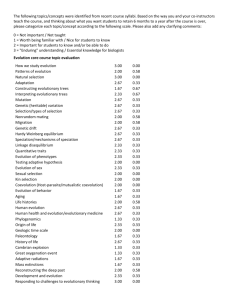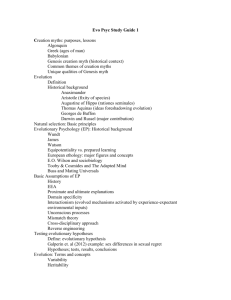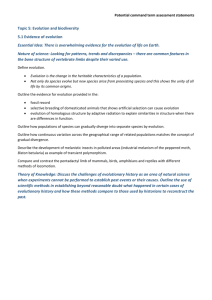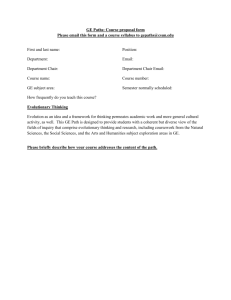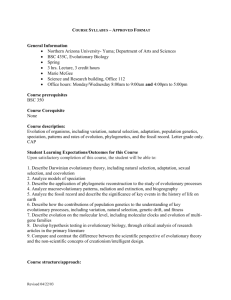Sample syllabus - users.muohio.edu
advertisement
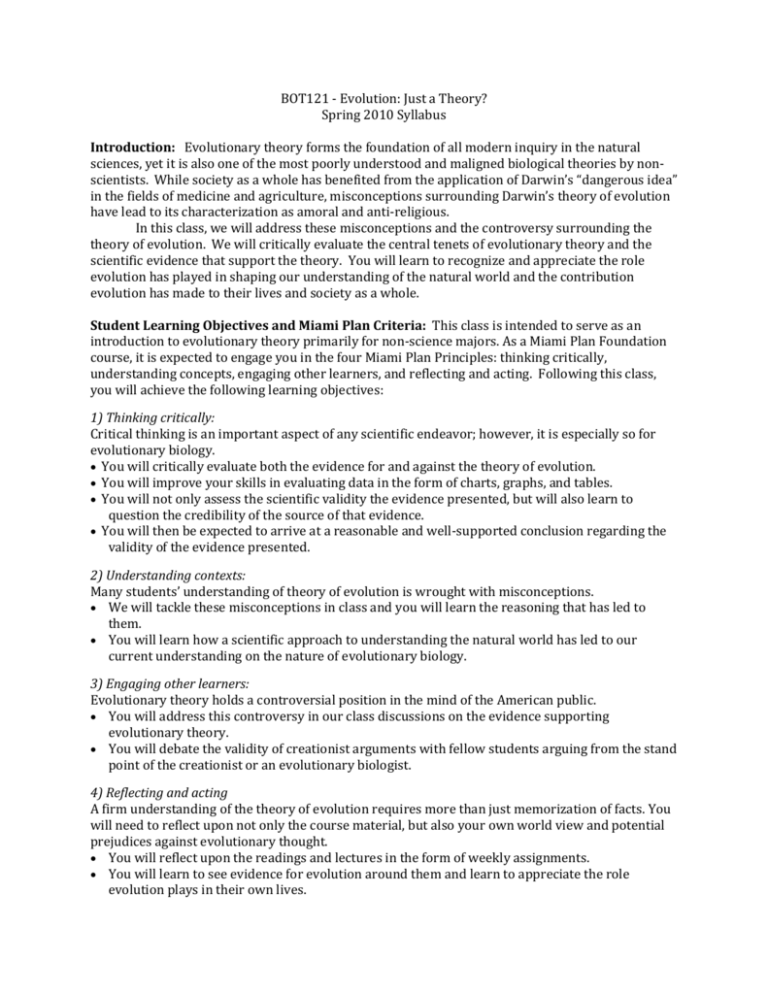
BOT121 - Evolution: Just a Theory? Spring 2010 Syllabus Introduction: Evolutionary theory forms the foundation of all modern inquiry in the natural sciences, yet it is also one of the most poorly understood and maligned biological theories by nonscientists. While society as a whole has benefited from the application of Darwin’s “dangerous idea” in the fields of medicine and agriculture, misconceptions surrounding Darwin’s theory of evolution have lead to its characterization as amoral and anti-religious. In this class, we will address these misconceptions and the controversy surrounding the theory of evolution. We will critically evaluate the central tenets of evolutionary theory and the scientific evidence that support the theory. You will learn to recognize and appreciate the role evolution has played in shaping our understanding of the natural world and the contribution evolution has made to their lives and society as a whole. Student Learning Objectives and Miami Plan Criteria: This class is intended to serve as an introduction to evolutionary theory primarily for non-science majors. As a Miami Plan Foundation course, it is expected to engage you in the four Miami Plan Principles: thinking critically, understanding concepts, engaging other learners, and reflecting and acting. Following this class, you will achieve the following learning objectives: 1) Thinking critically: Critical thinking is an important aspect of any scientific endeavor; however, it is especially so for evolutionary biology. You will critically evaluate both the evidence for and against the theory of evolution. You will improve your skills in evaluating data in the form of charts, graphs, and tables. You will not only assess the scientific validity the evidence presented, but will also learn to question the credibility of the source of that evidence. You will then be expected to arrive at a reasonable and well-supported conclusion regarding the validity of the evidence presented. 2) Understanding contexts: Many students’ understanding of theory of evolution is wrought with misconceptions. We will tackle these misconceptions in class and you will learn the reasoning that has led to them. You will learn how a scientific approach to understanding the natural world has led to our current understanding on the nature of evolutionary biology. 3) Engaging other learners: Evolutionary theory holds a controversial position in the mind of the American public. You will address this controversy in our class discussions on the evidence supporting evolutionary theory. You will debate the validity of creationist arguments with fellow students arguing from the stand point of the creationist or an evolutionary biologist. 4) Reflecting and acting A firm understanding of the theory of evolution requires more than just memorization of facts. You will need to reflect upon not only the course material, but also your own world view and potential prejudices against evolutionary thought. You will reflect upon the readings and lectures in the form of weekly assignments. You will learn to see evidence for evolution around them and learn to appreciate the role evolution plays in their own lives. Professor: Dr. Richard C. Moore Office: 394 Pearson Hall; Phone: 529-4278; email:moorerc@muohio.edu Office Hours: 9-10:30 T/Th, or by appointment. Meeting time: 2:15-3:05 pm on Monday, Wednesday, and Friday in 306 Pearson Hall. Textbooks: -Evolution vs. Creationism, second edition, 2009, by Eugenie C. Scott - Why Evolution is True, 2009, by Jerry A. Coyne - Evobeaker, SimBiotic Software (three labs plus CD-ROM) Evolution versus Creationism by Eugenie C. Scott will guide our discussions on the nature of science and the controversy surrounding the theory of evolution. Why Evolution is True is an evidencebased account of the central concepts of evolutionary biology written for the general public. Many of our examples of evolutionary concepts are described in this text, although I may also use examples from outside sources. The evolutionary software, Evobeaker, includes three modules designed for non-majors evolutionary biology classes. Students will perform Evobeaker activities outside of class and discuss the implications of their results in class. Supplementary reading: Although the major portion of the course centers around the above reading, I may also assign supplementary readings. These will mostly come from scientific newspaper articles (e.g. The Science Times section of The New York Times) and magazines (e.g. Scientific American). There also exist a fair number of educational videos that can supplement learning both within and outside the class (PBS Evolution series; NOVA: Evolution on Trial). Activities: Discussion and activities that reinforce key concepts will be integrated into the lecture portion of the class. Examples of activities and the Miami Plan principle(s) they incorporate in parentheses include: -Active discussion of primary and supplementary reading materials (engaging other learners, reflecting and acting) -Hands-on activities to illustrate key concepts in evolutionary theory (such as variation) and underlying genetics (thinking critically, engaging other learners) -Write-up and discussion of examples of recent evolutionary discoveries identified by students in popular scientific articles (understanding contexts, reflecting and acting) -Weekly assignments (blogs) by students describing their impressions of that week’s readings/lessons (thinking critically, reflecting and acting) -Debate on the validity of creationist arguments (engaging other learners, reflecting and acting). Assessment: -Three quizzes designed to test your knowledge of the concepts and provide “practice” for exams. -Two “midterm” exams (non-cumulative) and one final exam (cumulative). -Three evobeaker labs. These are to be completed before the due date on your own; however we will discuss them in class. -One midterm paper (describing a recent evolutionary discovery) -One end of class debate on a creationist argument. -Weekly “blogs” (online assignment; 1 to 3 questions reflecting upon the previous or upcoming material). Note: If you miss a quiz or exam, or do not turn in an assignment by the required deadline, you will receive a zero for that assignment. Late assignments and/or make-up exams/quizzes will only be given to those with a written medical excuse (doctor’s note on letterhead stationery) or a family emergency such as the death of a family member (letter from a parent with daytime phone number is required). Point Break down: Category Exams Papers/Projects Quizzes Evobeaker Assignments Assignment Exam 1 Exam 2 Final exam Midterm paper Final Debate Quiz 1 Quiz 2 Quiz 3 Evobeaker 1 Evobeaker 2 Evobeaker 3 Weekly assignments TOTAL % of Grade 10% 10% 15% 10% 15% 5% 5% 5% 5% 5% 5% 10% Total per Category 100% 100% 35% 25% 15% 15% 10% Final course grade: Percentage of course points 90-92 / 93-96 / 98-100 80-82 / 83-86 / 87-89 70-72 / 73-76 / 77-79 60-62 / 63-66 / 67-69 Less than 60 Grade Range A- / A / A+ B- / B / B+ C- / C / C+ D- / D / D+ F Academic Misconduct: You are expected to do your own work in this course. Please read Miami University's policy on Academic Misconduct in The Student Handbook (Section V): http://www.miami.muohio.edu/documents_and_policies/handbook/academic_regulations/acadre gspv.cfm. We will handle all cases of academic misconduct according to the official guidelines set forth in the Student Handbook. You must be careful to avoid plagiarism in any written assignment that you submit for this class. Plagiarism is using the words or presenting the ideas of someone else without properly citing that person’s work. If the words or ideas you use are based on another work, you should always cite the work. Using the words of others and failure to properly cite your resources is also considered a case of academic misconduct and will be handled as stated above. Withdrawal policy: If a student drops a full semester course by the third week deadline (Feb 1), the course will be removed from the record. If a student drops a course between the third week and ninth week of the term (Mar 25), a "W" will be recorded. A student cannot normally drop a course after the ninth week of the term and the only way to drop at this point is by petition. Course Content: Week Date Lecture Topic Intro to class Nature of Science Nature of Science Primary Reading EvC , Chapter 1 EvC, Chapter 13 TBA Quizzes, Exams, Assignments due WEEK 1 Jan 11, 13, 15 WEEK 2 Jan 20, 22 WEEK 3 Jan 25, 27*, 29 History of Evolution with special focus on Charles Darwin WEEK 4 Feb 1, 3, 5* WEiT Chapter 1: What Is Evolution WEiT 1 WEEK 5 Feb 8, 10, 12 WEiT Chapter 2: Written in the Rocks WEiT 2 WEEK 6 Feb 15, 17*, 19 WEiT Chapter 3: Remnants WEiT 3 Exam #1 WEEK 7 Feb 22, 24, 26* WEiT Chapter 4: The Geography of Life WEiT 4 Evobeaker 2 WEEK 8 Mar 1, 3, 5* WEiT 5 Paper #1 due WEEK 9 Mar 16, 17*, 19 WEiT Chapter 5: The Engine of Evolution WEiT Chapter 6: How Sex Drives Evolution WEiT 6 Quiz #2 WEEK 10 Mar 22, 24, 26* WEiT Chapter 7: The Origin of Species WEiT 7 Evobeaker #3 WEEK 11 WEEK 12 Mar 29, 31*, Apr 2 WEiT Chapter 8: What about us? WEiT 8 Exam #2 Apr 5, 7, 9 Special Topics and/or Catch up week. WEEK 13 Apr 12, 14*, 16 Creationism: What is that all about? EvC, Chapter 3, 6 Quiz 3 WEEK 14 Apr 19, 21, 23 Evolution on Trial Student Presentations/Debate WEEK 15 Apr 26, 28, 30 Quiz #1 Evobeaker #1 (Evidence) Final Project Evolution on Trial Final Project Student Presentations/Debate Class reflection FINALS May 7* FINAL EXAM Final Exam WEEK Friday, 5/7, 10:15-12:15 EvC= Evolution vs. Creationism; WEiT=Why Evolution is True *Starred dates are those when an assignment is due and/or there will be a quiz/exam. Note: This syllabus is subject to change (as some topics may take longer/shorter than planned). I may also assign additional readings throughout the course.



